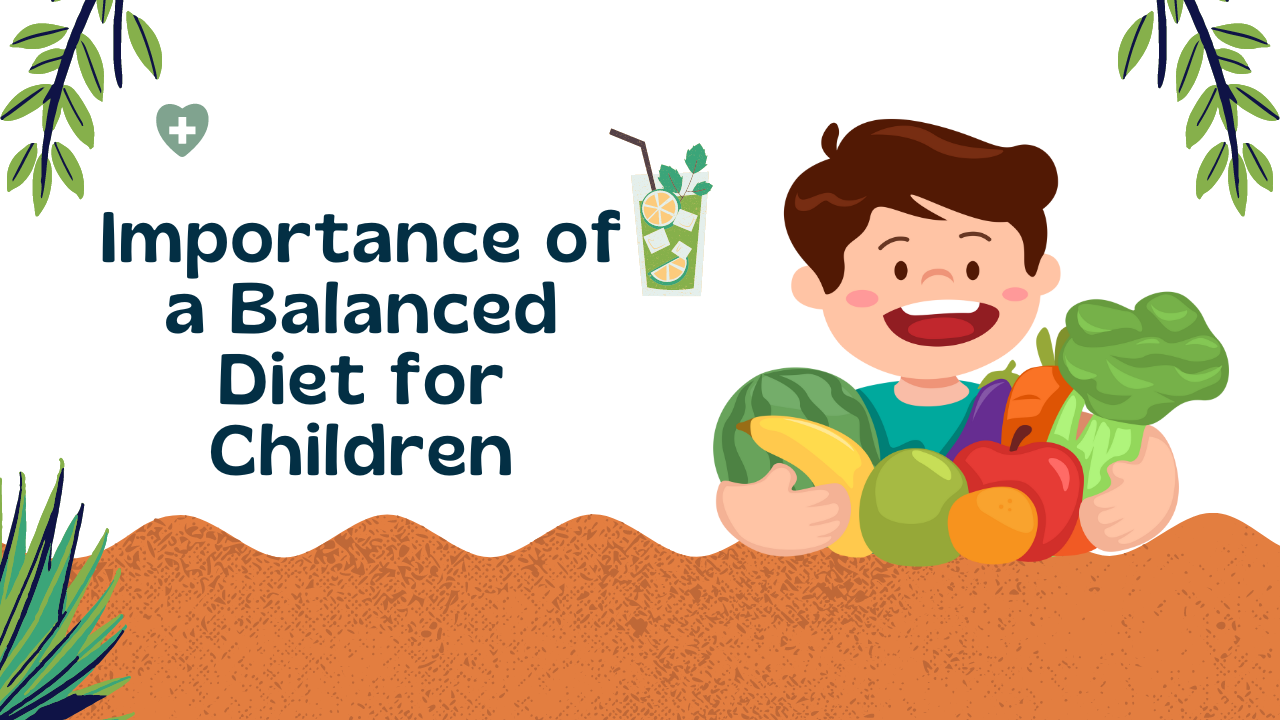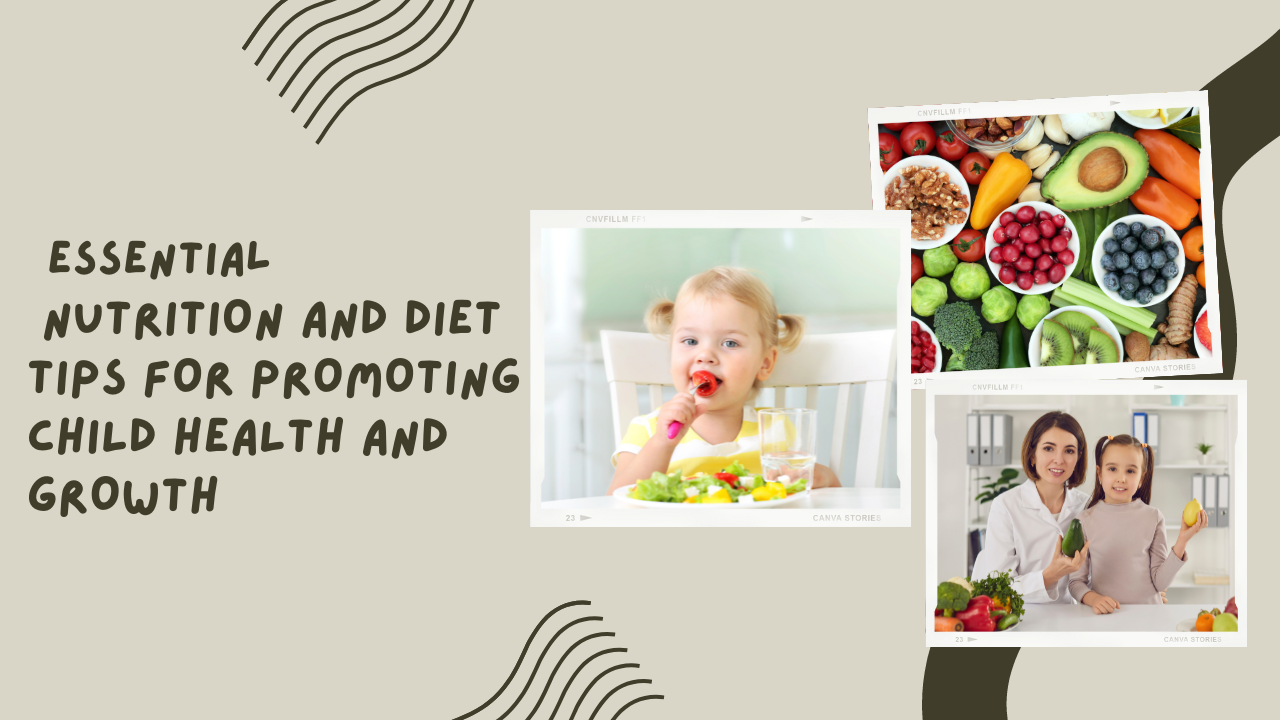Childhood is a necessary time for growth and development, and nutrition is essential in helping children achieve their maximum potential. Nutritional guidance benefits physical development, enhances cognitive development, improves immune function, and helps establish the foundation for health in the years ahead. This article offers essential diet and nutrition guidelines to ensure your child’s health and development, providing family members and parents with the information they need to support their children’s health.
Understanding Child Nutrition Needs
Because of their rapid rate of growth and development, children have specific nutritional requirements that differ from adults. The most important nutrients for children’s growth are proteins, carbohydrates, fats, vitamins, and minerals. These nutrients prepare the foundational elements needed to ensure strong bones, muscles, and organs and the energy required to perform physical activities and develop cognitively.
As children age and develop, their nutritional requirements alter. For instance, toddlers require more fat to support brain development, and youngsters in school require more protein to help support muscle growth and physical activity. Conversely, adolescents require more nutrition and calories to accommodate rapid growth and hormonal changes. Understanding the changing demands of adolescents is vital to ensure children are getting the right amount of nutrients at every age of development.
Importance of a Balanced Diet for Children

A balanced diet contains a variety of foods from the primary food groups, including fruits, grains, vegetables, proteins, and dairy (or dairy alternatives). This helps ensure that children get all the necessary nutrients for optimal health and growth. A balanced diet can help maintain a healthy weight, support healthy brain function, and decrease the risk of developing chronic illness later in life.
The advantages of eating a balanced diet for children go far beyond health. Nutritional health is crucial to mental well-being and development. Children with an appropriate diet will likely enjoy more energy, higher concentration, and better academic performance.
Macronutrients: Building Blocks of Child Growth
Macronutrients are essential nutrients that provide the energy needed for growth and development. They comprise carbohydrates, proteins, and fats.
- Proteins are the essential building blocks of our body and are crucial for the growth and maintenance of tissues. They are vital for developing muscles, immune function, and creating hormones and enzymes. Protein sources for children are lean proteins, fish, poultry, eggs, beans, seeds, lentils, nuts, dairy, and other products.
- Carbohydrates are your body’s leading source of energy. They are essential for children, who require more power because of their rapidly growing bodies and active levels. Complex carbohydrates, like whole grains, vegetables, fruits, and legumes, grant long-lasting energy and are high in fiber, which helps in digestion.
- Fats are vital for brain development, hormone production, and the metabolism of fat-soluble vitamins (A, D, E, and K). Healthy fats, like those found in avocados, seeds, nuts, olive oil, and fat-rich fish, are essential for children’s development and general well-being.
Micronutrients: Essential Vitamins and Minerals
Micronutrients are minerals and vitamins that are essential in lesser amounts but equally crucial for infant health.
- Calcium is necessary for the development of strong teeth and bones. Dairy products, fortified milk made from plant sources, leafy greens, and tofu are excellent sources of calcium.
- Iron is required to produce hemoglobin, a protein that carries oxygen throughout the blood. It is crucial during rapid growth, such as the adolescent and infant years. Iron-rich foods include poultry, red meat and fish, beans, lentils, and fortified cereals.
- Vitamin D Vitamin D aids the body’s absorption of calcium and is essential for the health of bones and the immune system. It is obtainable through sunlight exposure, fortified food items, and supplements.
- Vitamin C: Vitamin C helps strengthen the immune system and assists in absorbing iron from plant sources. It can be found in fruits like strawberries, oranges, Kiwi, oranges, and even vegetables like bell peppers and broccoli.
- Zinc is vital for immune function, growth, and wound healing. It can be found in seafood, meat, dairy products, seeds, nuts, and whole grains.
Hydration and Its Role in Child Health
Hydration is essential for maintaining general health and well-being, particularly for children, who are more susceptible to dehydration because of their excellent activity and higher metabolism. Water regulates body temperature, transfers nutrients, and eliminates waste.
Dehydrated children may exhibit dry mouth, dizziness, fatigue, or dark urine symptoms. To avoid dehydration, encourage kids to drink water frequently all day, particularly in hot weather or after exercising. Reduce the consumption of sugary drinks and juices since they cause tooth decay and the consumption of too many calories.
Healthy Eating Habits for Kids
Making healthy eating habits a priority at an early age can lay the stage for a lifetime of healthy nutrition. Instruct children to consume a wide range of food items from all food groups and to avoid eating with the “clean plate” attitude, which can lead to excessive eating. Instead, concentrate on portions and eating mindfully.
Food and snack time are crucial to maintaining energy levels and avoiding overeating. Provide balanced snacks with an assortment of carbohydrates, protein, and healthy fats, like fruits with yogurt or whole grain snacks with cheese.
Incorporating Fruits and Vegetables in Meals
Fruits and vegetables are high in minerals, vitamins, and antioxidants. They also contain fiber, vitamins, and minerals, vital for children’s health. They strengthen immunity, aid in good digestion, and lower the risk of chronic diseases.
To get children to consume more vegetables and fruits, Try these tips:
- Make it fun: Create vibrant plates that include a variety of vegetables and fruits, and make fun shapes and arrangements to make the plates more attractive.
- Engage children in Meal Prep: Let kids benefit by peeling, washing, and chopping vegetables and fruits. This will inspire them to be more enthusiastic about exploring new food items.
- Blend them in: Add fruit and vegetables to smoothies, soups, sauces, and baked goods to give them a delicious and nutritious energy boost.
Limiting Sugar and Processed Foods

Consuming excessive amounts of sugar and processed foods may negatively affect the health of children and lead to weight gain, tooth decay, and a greater chance of developing chronic illnesses. Processed food is often rich in sodium, unhealthy fats, and other additives that add only a small amount of nutritional value.
To limit consumption of processed foods and sugars, Limit beverages and snacks that are high in sugar, and opt for fresh, unprocessed meals whenever possible. Offer healthier options like fresh fruit or nuts and homemade snacks.
The Importance of Breakfast for Children
A healthy, balanced breakfast is crucial for children because it provides the energy required to start the day and helps with concentration and learning. Insufficient breakfasts can lead to stress, anxiety, and lower cognitive performance.
Healthy breakfast choices for kids include:
- Whole-grain cereals, oatmeal, or oatmeal with milk and fruits
- Eggs served with toast made of whole grain and avocado
- Yogurt made with fruit and granola
- Smoothies made from vegetables, fruits, and protein-rich components like Greek yogurt or Nut butter
Promoting Physical Activity Alongside Nutrition
Physical exercise is an essential supplement to healthy eating since it assists children in developing strong muscles and bones, maintaining an ideal weight, and improving the health of their cardiovascular system. Inspire children to take part in at least 60 minutes of exercise each day, and this could involve exercising outside cycling, playing on a bike, dancing, taking part in dance classes, or participating in organized activities.
Special Dietary Considerations
Certain children may have special diet requirements due to intolerances, allergies, or family preferences. For instance, children suffering from lactose intolerance could require avoiding dairy products, whereas vegans or vegetarians may need other sources of calcium, protein, and iron.
In these situations, it is essential to consult with a health professional or a nutritionist for advice on how to ensure that your child’s nutrition meets their nutritional requirements and encourages healthy growth.
Common Nutrition Myths About Child Growth
There are a myriad of misconceptions and myths regarding child nutrition that could lead to confusion and poor choices in dietary selections. These are commonly held beliefs that have been dispelled:
- The myth is that children drink cow’s milk to build sturdy bones.
- While cow’s milk can be a great source of calcium, kids can also get calcium through other food sources, such as fortified bowls of milk made from plants, leafy greens, tofu, and almonds.
- Myth: Carbohydrates make children gain weight.
- Carbohydrates are a vital energy source for children. Whole grains, fruits, vegetables, and legumes provide crucial nutrition and must be part of a healthy diet.
- Myth The idea that children should consume a diet that is low in fat.
- Healthy fats are essential to cognitive development and overall well-being. Children should eat various healthy fats, such as avocados, seeds, nuts, and olive oil.
Involving Kids in Meal Planning and groundwork

Participating in meal planning and preparation is a great way to benefit children, build a positive connection with food, and promote good eating behaviors. Cooking together can also be a chance to educate children about food safety, nutrition, and the necessity of having a healthy diet.
To make food preparation enjoyable and instructive:
- Let Kids Decide: Let children have the opportunity to choose the ingredients they want or recipes and involve them in grocery shopping.
- Teaching Cooking Skills: Let children learn to measure ingredients, utilize kitchen equipment, and follow recipes.
- Create It Interactive: Make cooking fun by letting kids benefit from chores like mixing, stirring, or decorating.
Conclusion
Nutritional health is vital to growing and healthy children. By providing a balanced diet rich in essential nutrients, promoting healthy eating habits, and including children in meal planning and cooking, Parents and caregivers can help their child’s physical, mental, and emotional development. Remember that the habits formed in the early years will last a lifetime, so begin forming healthy eating habits today to ensure an improved tomorrow.
FAQs
Which are the top essential nutrients needed for the growth of a child?
Key nutrients essential for a child’s growth include carbohydrates, proteins, healthy fats, vitamins (like A, C, D, and B Vitamins), and minerals (such as iron, calcium, and zinc). These nutrients aid in a range of development factors, from bone development and muscle growth to the brain’s immune system and brain health.
How can I motivate my child to consume more fruits and vegetables?
Help your kid consume more fruits and vegetables by making meals fun and exciting. Cut fruits and vegetables into fun shapes, include your child in the preparation of meals, and supply a wide range of fresh and colorful vegetables. You can also mix the fruits or vegetables in smoothies. You can include them in your favorite dishes, such as pizza or pasta.
Does it make sense for my child to eat a vegan or vegetarian diet?
Yes, children can eat a vegan or vegetarian diet; however, ensuring they get all the necessary nutrients is important. This includes iron, protein, calcium, iron, vitamin B12, and omega-3 fats. Consulting a healthcare professional or nutritionist may benefit from creating a balanced vegetarian or vegan diet for your child.
How much does my child need to drink water every day?
The amount of water a child requires depends on age, activity level, and weather. In general, infants and children require around 4 cups of water daily, while adolescents and older children should aim for 6-8 cups. Insist on regular water intake and give water-rich food items, such as fruit and veggies.
Are there healthy and nutritious breakfast suggestions for children?
Healthy breakfast ideas for children include whole-grain cereals, fruit-based oatmeal, eggs with toast made of whole grain and avocado or yogurt with berries, Granola, or a shake composed of fruits, vegetables, and protein-rich food items such as Greek yogurt or nuts in nut butter. A healthy breakfast will grant the energy and nutrition required for a productive day.
